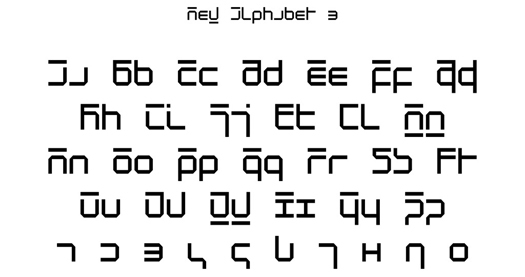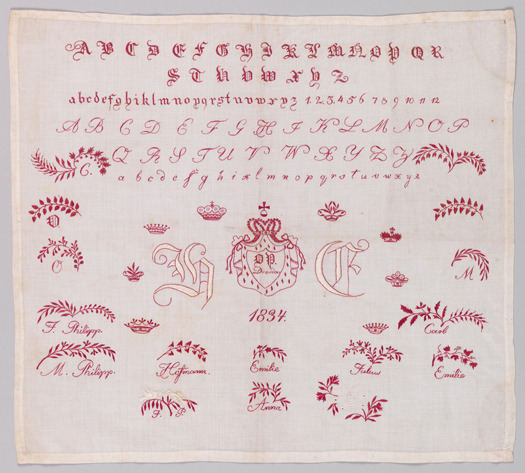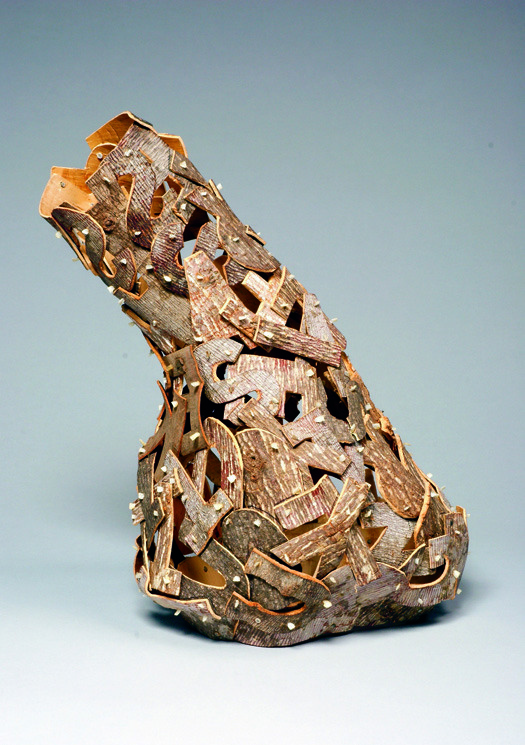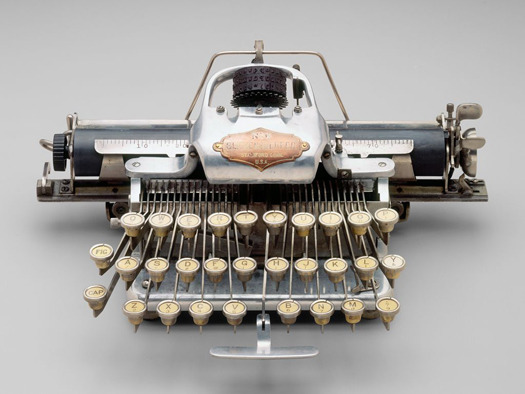
Wim Crouwel (Dutch, born 1928) New Alphabet 1967. (courtesy Museum of Modern Art)
I’ve written several times about Tumblr as a platform for everyday interactions with museums, archives and other collections of visual and historical artifacts (see here, here and most recently here, in "Shopping With Sandro"). One of the benefits of museum Tumblrs and similar projects like the Cooper-Hewitt, National Design Museum’s Object of the Day, is the potential they have to surface items in the collection that have not been exhibited for years, to hold them up next to more current and popular objects, and see what connections happen. The Tumblr can be like a sketch of curation, cheaper and less consequential than an exhibit; or deeper and wonkier on a particular, even personal topic.
When I was asked by Jake Yuzna and Dan Rubinstein to contribute ideas to the Museum of Arts and Design’s spring public series on the theme After the Museum, a Tumblr was the first thing that sprang to mind. One of the aspects that intrigues me about the platform is the potential for lightness, visual jokes, and play. I decided to structure my Tumblr as a curatorial game of free association (and potentially one-upmanship). As the editor, I set the themes, 13 in total. Then I sent them out to curators of design, architecture, decorative arts and crafts collections across the United States, essentially saying, Show me what you’ve got. I defined design in the broadest terms in hopes of getting some unusual neighbors, and I put the start date at 1850, where the architectural historians like to begin modernism.

Marking sampler (Dresden, Germany, 1834) Embroidered on cotton. (courtesy Cooper-Hewitt, National Design Museum)
In December I invited more than two dozen curators, geographically dispersed, to participate. By January, 13 had agreed to send me five to ten objects from their collections in response to my themes. I must to thank all of the participants for fitting this project into their busy schedules and for being good sports: Zoe Ryan, Art Institute of Chicago; Rachel Delphia, Carnegie Museum of Art; Ellen Lupton, Cooper-Hewitt, National Design Museum; Darrin Alfred, Denver Art Museum; Mel Buchanan, Milwaukee Art Museum; Jennifer Komar Olivarez, Minneapolis Institute of Arts; Lyndsay Bratton, Museum of Arts and Design; Sarah Margolis-Pineo, Museum of Contemporary Craft; Emily Zilber, Museum of Fine Arts, Boston; Paola Antonelli and Barbara Eldredge, Museum of Modern Art; Lena Vigna, Racine Art Museum; Andrew Blauvelt, Walker Art Center; and Ivana Rodriguez, The Wolfsonian-FIU. Sophie May and Reply coordinated and designed the Tumblr at MAD. The curator's texts make fascinating mini-histories and take many different approaches to defining an object. Opening the emails with the images attached was like a virtual Christmas morning (if you are a collections nerd).

John McQueen, Untitled, 1994. Tulip poplar bark and plastic rivets. (courtesy Racine Art Museum)
The result launched this week at metamuseum.tumblr.com. If you are on Tumblr, please follow for 13 weeks of fascinating objects, seven days a week. If you’re not on Tumblr I would suggest checking in on weekends, when you’ll be able to see all the objects that illustrate each theme. @MADMuseum will also be tweeting the items daily. I won’t reveal all of the themes, since discovery is part of the fun, but I will say they run from Alphabet to Year One (something from the year of the museum’s founding). The images in this post are all responses to the Alphabet theme, and give a good sense of the project’s diversity. At its end I hope the Tumblr will serve as a discussion-provoking survey of modern and contemporary design, and will foster other posts (in visual or verbal form) on what we might learn from this collaborative experiment.
Coincidentally, the editors of art blog Hyperallergic are sponsoring The World's First Tumblr Art Symposium on March 9 in Brooklyn. I would attend if I could. Leading up to it they have published a series of essays analyzing the intersection of art, artists, museums and Tumblr, posted here.

George C. Blickensderfer (American, 1850-1917) Model 6 portable typewriter, c. 1906, aluminum, steel. (courtesy Minneapolis Institute of Arts)
Also this week, I reviewed a tiny new exhibition at the Metropolitan Museum of Art, “Plain or Fancy? Restraint and Exuberance in the Decorative Arts”, for the Culture Desk blog at the New Yorker. Drawn from the Met's European decorative arts collections, this is the kind of exhibition that would work very well on Tumblr. The Met decided instead to put it on Twitter, @PlainorFancy, and there are a pair of iPads in the gallery for viewers to vote up or down on their taste for severity v. ostentation. (The results are not encouraging so far.) As I say in the review, “I tried, really I did,” to like some of the things on the fancy side. And I learned an onomatopoeic new vocabulary word, “prunt.”
